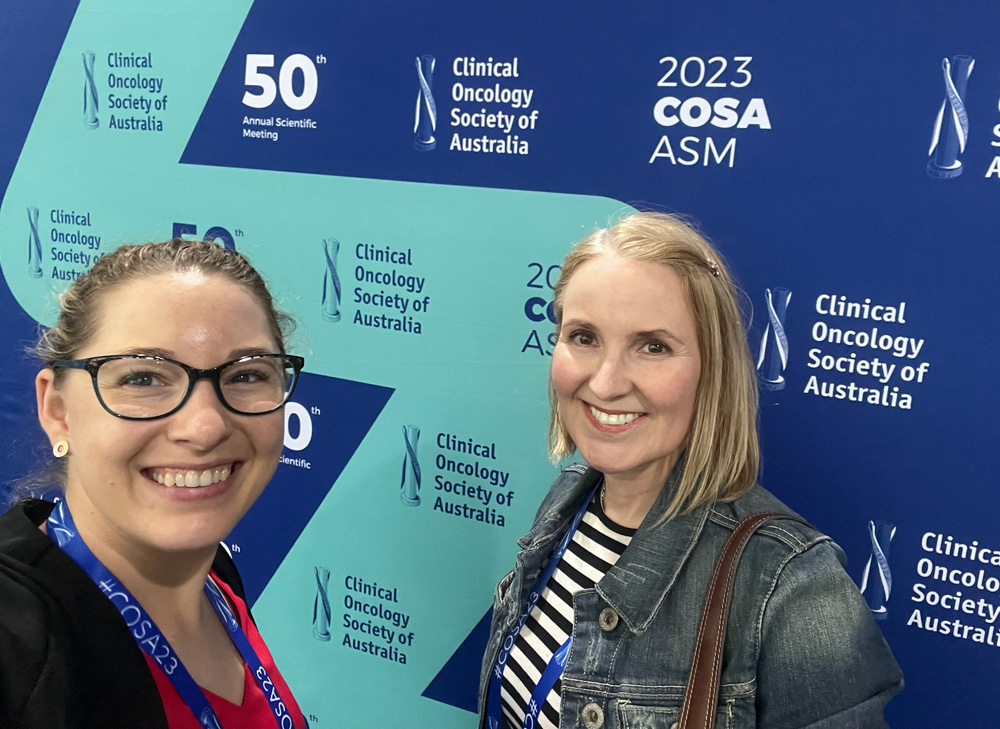
Staff learn about cancer care advancements
Two radiotherapists from the Albury Wodonga Regional Cancer Centre recently travelled to Melbourne for a three-day conference featuring national and international leaders in cancer care.
Following a grant from the Albury Wodonga Regional Cancer Centre Trust Fund Education Committee, Yvonne Kerr and Jo Dawkins attended the Clinical Oncology Society of Australia (COSA) Annual Scientific Meeting from November 1 to November 3.
There the GenesisCare professionals played a role in advancing their field, and developing new and improved cancer care options for patients worldwide.
Below is a report of some of their key learnings:
Breast cancer treatment: A success story
Breast cancer outcomes have shown remarkable progress over the past four decades, with research data demonstrating a significant decrease in breast cancer mortality.
This decrease can be attributed to the continuing development of systemic therapies and the implementation of mammogram screening.
One of the significant breakthroughs is the advancement in genomic techniques, which enables the identification and targeting of specific mutations responsible for tumour growth.
There has also been substantial progress in the development of drugs capable of delivering anti-cancer treatment directly to tumour cells, thereby reducing damage to healthy tissue.
These approaches offer personalised treatment strategies for individuals battling breast cancer, allowing for more effective and precise care.
Additionally, the field of immunotherapy holds great promise in the treatment of breast cancer, offering new avenues for patients in the fight against this disease.
Artificial Intelligence (AI) has gained prominence in healthcare, and its applications extend to breast cancer care.
Trials have demonstrated the success of AI in assisting with the reading of mammogram screenings.
AI is particularly effective in identifying high risk patients, irrespective of breast tissue density, improving early detection and intervention.
The Australian Cancer Plan: A landmark initiative
The Australian Cancer Plan was officially launched at COSA’s 50th ASM, marking a historic milestone in the realm of cancer care.
This comprehensive plan sets forth a series of objectives, aiming to transform cancer care in Australia.
The plan’s key objectives include maximising prevention and early detection, enhancing the patient and caregiver experience, ensuring world-class care, building strong foundations based on research and data, revolutionising the delivery of care through the healthcare workforce, and achieving equity in outcomes for Aboriginals and Torres Strait Islanders.
Professor Dorothy Keefe, the CEO of Cancer Australia described this plan as “the biggest thing in cancer control in Australia,” emphasising its potential to bring equitable and optimal care within reach for everyone.
The plan was crafted through collaboration with various parties, including the cancer sector, states and territories, First Nations communities, clinicians, researchers, patients, and support organisations.
The Australian Minister of Health and Aged Care, Mark Butler, acknowledged that whilst cancer outcomes in Australia are among the best in the world, disparities persist due to individual circumstances and geographical location.
The plan addresses these concerns, aiming to create a healthcare system that bridges this gap.
With the prevalence of cancer increasing, the government has allocated $500 million to support the implementation of this transformative plan.
The plan is available online at www.australiancancerplan.gov.au
Cervical cancer: Progress towards elimination
Australia is making significant strides in the fight against cervical cancer, with a goal to eliminate it as a public health concern by 2035.
This progress is attributed to the National HPV Vaccination and Screening Program.
The transition from pap smears to HPV-based screening has reduced cervical cancer rates by up to 25 per cent, offering a more effective and reliable method of early detection.
Physical activity during cancer treatment has emerged as a crucial factor in improving patient outcomes.
Exercise offers numerous benefits, such as reducing the risk of cardiovascular problems, mitigating the severity of treatment-related side effects, enhancing overall well-being, and reducing the toxicity of anti-cancer therapies.
Moreover, exercise interventions can be delivered in various settings by a range of healthcare professionals.
The Wellness Centre within the Albury Wodonga Regional Cancer Centre offers exercise therapy options for individuals undergoing cancer treatment, contributing to their holistic well-being and recovery.
We extend our gratitude to the Trust Fund for affording us the opportunity to attend the COSA ASM.
Participating in cutting-edge conferences like the ASM is instrumental in ensuring that we remain up-to-date with the latest innovation in cancer care.
This knowledge empowers us to continue delivering the best possible care to our local community, bridging the gap between advancements in cancer care and the patients we serve.
Jo Dawkins and Yvonne Kerr
Genesis Care


